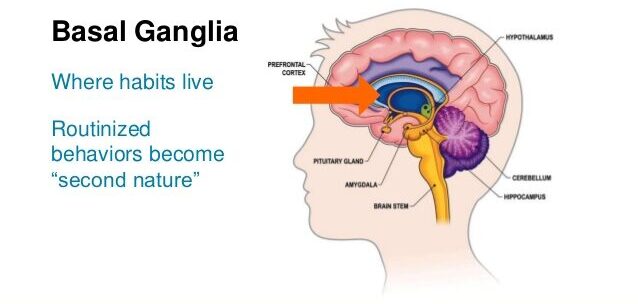Old Habits Die Hard: Your Guideline to Hacking the Habits
Written By: Jamie Petersen
Life as we know it is a mass of neurological pathways that have been ingrained into our systems, forming the habits that we associate with as our day-to-day tasks.
The majority of the time, we tend to function on autopilot – for example, when you drive, you don’t physically tell yourself to change gears or brake when you come to a red light. It’s engrained into a pathway that has existed since you started driving.
A fun fact about smoking; no one ever teaches a smoker how to hold a cigarette or which fingers to use. It’s behavior that we learn through watching others and building pathways.

Old Habits Die Hard!
Mick Jagger was right when he sang the song “Old Habits Die Hard!” Undoubtedly, old habits are difficult to stop.
And I can’t give you up.
Can’t leave you alone
And it’s so hard, so hard
And hard enough to feel the pain
Old habits die hard
The habits that we generate in our daily lives are there to help us function. Sadly, we tend to lean heavily on our habits and end up living robotic lives instead of enjoying life to the fullest with a different mindset from the rest.
Why do old habits die hard?
The area of the brain where your habits are formed, called the basal ganglia, remembers all the pathways that your nerves fire on. This specific region of the brain is responsible for habit formation, step-by-step learning, and addiction.
When you develop a new habit, the neurons in that region of your brain create new connections and subsequently change their firing pattern. Once this new pattern has been learned, the old habit falls away like a forgotten road.
Remember, whether you learn a good or bad habit, the brain develops long-term connections. It is great news for your newly developed good habit, but not for your bad habits!

Image Source: www.slideshare.net/lyndadotcom/creating-a-transformative-culture-of-learning
How Do We Break or Hack Old Habits?
The main key to kicking a habit is to have a good support system, one that you feel at ease with and will not make you feel out of place to make life changes. Have good life mantras and positive statements designed to empower your thought and action process. You need to believe that you are worthy of the changes that you are setting about making.
Sleep! Getting quality sleep is quintessential to successfully being able to cope with and institute changes in your life. It’s when you reset and when you leave the day behind and allow your body to catch up. You need to focus on achieving better quality sleep and gaining at least one more hour of sleep per night.
There are a few streams of thought that we can look at to assist in the habit hacking area. Habits are psychological, and as such hacking them has a lot to do with your psyche. Let’s look at a few key methods that you can use to break through the barrier and form new habits for healthier living.
Adjust Your Mindset
This may sound like a cliché, but no habits will ever be broken without this first step. Your mindset needs to be in the correct frame before you can make any changes in your life. You are the only person responsible for your actions, turn that around and be empowered by them for a change.
Break one habit at a time
The second hack goes hand in hand with the first. It is pointless overwhelming yourself by making a list of habits we want to hack overnight. You simply will not cope. Besides it being overwhelming, the objective is too far out of reach. It will ultimately end up in negative feelings and having the opposite effect on your life than what was intended. Weigh up the pros and cons, and focus on the long-term benefit that you will be gaining and go for it.
Be specific
Setting a goal is great, but we leave room for interpretation and often tend to miss the objective if it is not specific. For example: “Drink water” is not a specific goal to set. Yes, drinking water is healthy, but the statement “Drink water” leaves room for error.
How much water should you drink? Health enthusiasts state at least 2L per day. Make the goal “I must drink eight glasses of water per day”. This way, you will know exactly what the goal is and can achieve it more effectively.
Be conscious of triggers at this stage. For instance, going out with friends for lunch may be the prime time for you to indulge in a sugary beverage. Change that habit by taking lunch with bottled water to work 4 out of 5 days a week. Here you are killing two birds with one stone by hacking the bad habit and replacing it with a good one.
Track your habitual changes
Write everything down, even if this may seem tedious and time-consuming. The benefit of tracking habits is that it puts the bad habit into perspective for you to see in a real-life timeline. There are various ways that you can track your habits; you can use a diary, create a spreadsheet, or a more exciting and helpful tool would be that of an interactive online site such as Emote.
Emote is an online journal that allows you to take a step out of your normal day and spend some time on yourself for yourself. Emote allows you to join a journaling community where you can hack old habits and build new ones. You have the ability to set the goals that you most want to achieve and track them to completion.
In times such as these, with a pandemic changing the world, what better time is there than now to start journaling and to spend some quality time with your own thoughts.
Lastly, set a timeline.
Break the process of hacking the habit into chunks of time, such as 30, 60, and 90 days. This will make the process less overbearing in the beginning and give you something to work towards over a period of time. Set a start and end date and follow that through.
Don’t be too hard on yourself for minor setbacks along the way; these are likely to happen. If they do, acknowledge that a setback occurred, make a note of it and focus on changing the circumstances that lead to the setback thus preventing repetition.
By breaking your goals up into a timeline, you can work with achievable objectives. Remember to celebrate when you achieve those objectives. It is just as important to reward yourself for making the milestone as it is to set them.
Hacking the Habit
Hacking a habit is just as much a mental process as a physical process. If you are serious about extinguishing a bad habit, then give yourself ninety days and replace your bad habit with a new habit. A new habit will be fully integrated at ninety days, and all the pathways have been established in the basal ganglia.
When you drop the old habit, you will no longer run old programs in your brain that will negatively affect your health, perspective, and life quality. It is an empowering experience.
Journaling is an excellent tool for writing down your experience of breaking old habits. It will help you identify the mistakes you made and how you can learn from them in the future. It will also make more evident the success behind dropping that habit and the reward you can enjoy after that. Use Emote to document your habit processes; you will be pleasantly surprised by how helpful the journaling tool is to help you reach your goals. Sign up today to hack those bad habits and start your new habits with Emote!